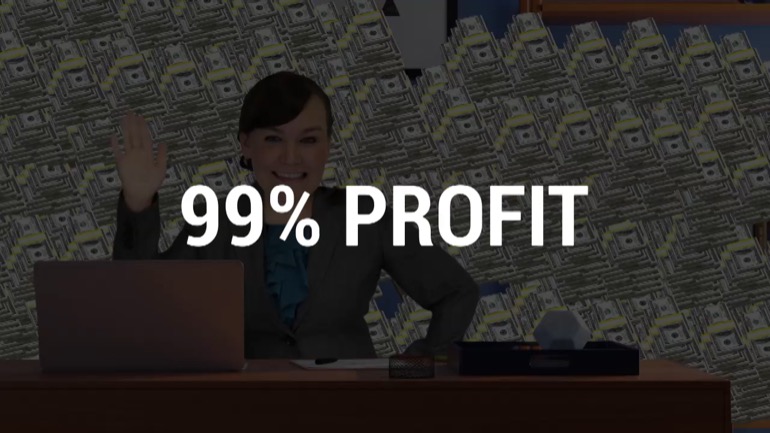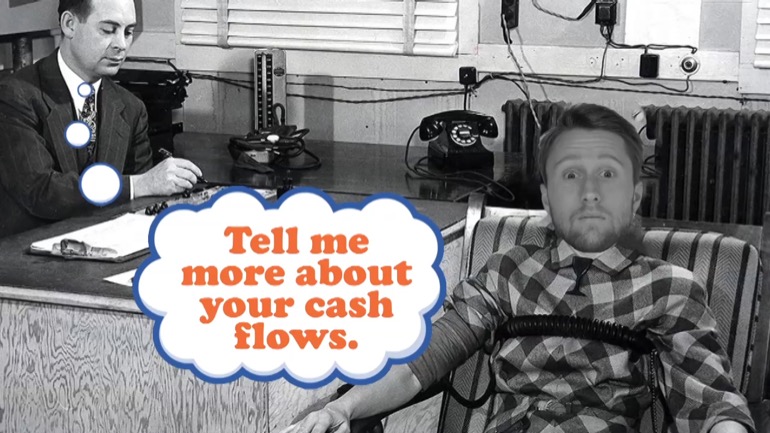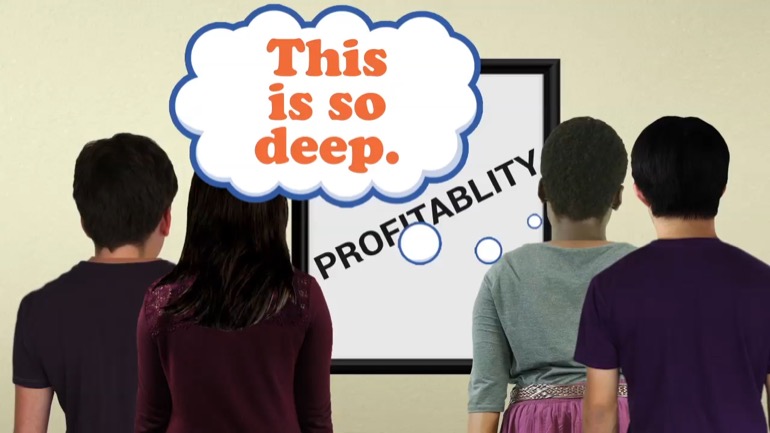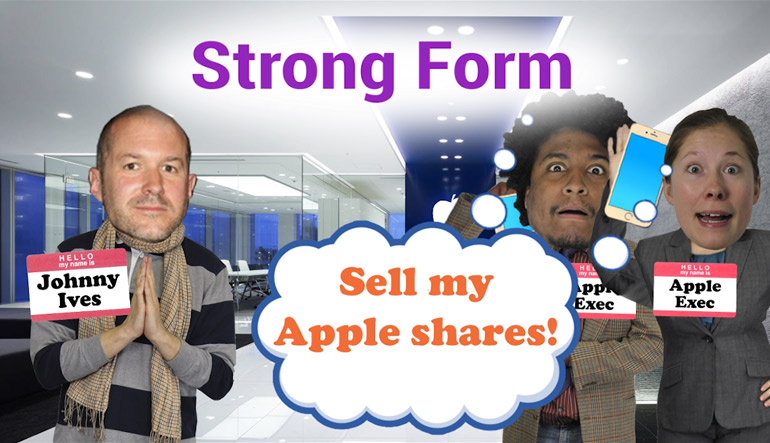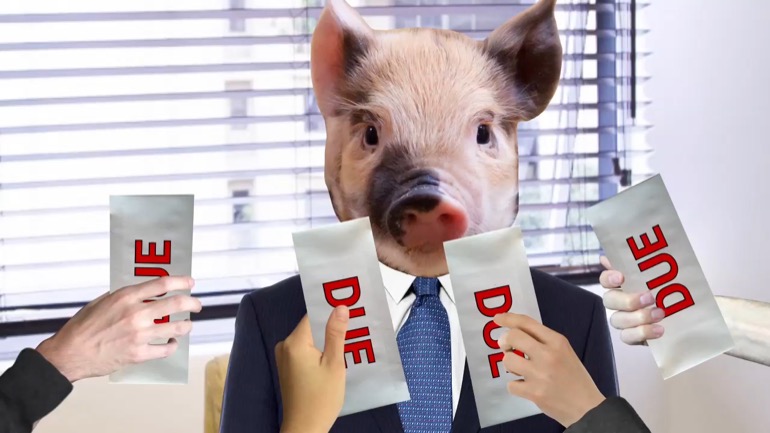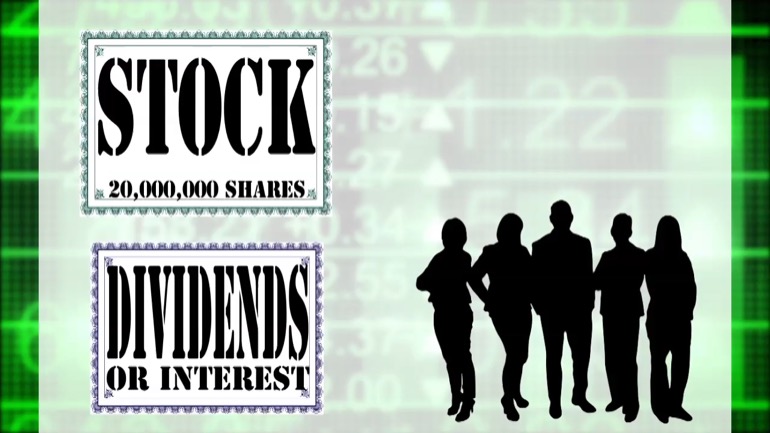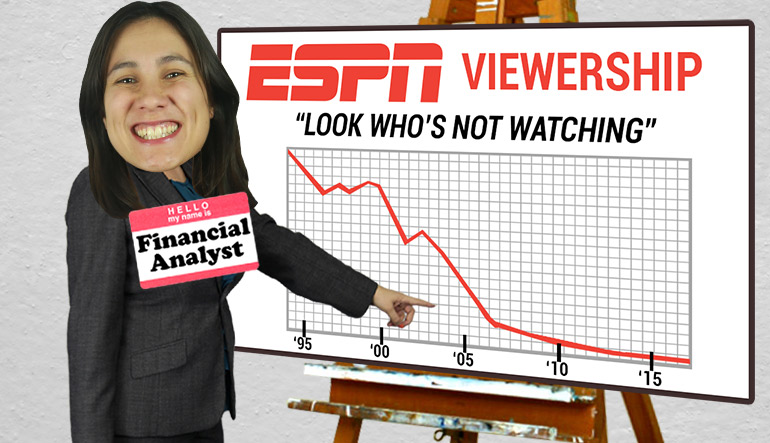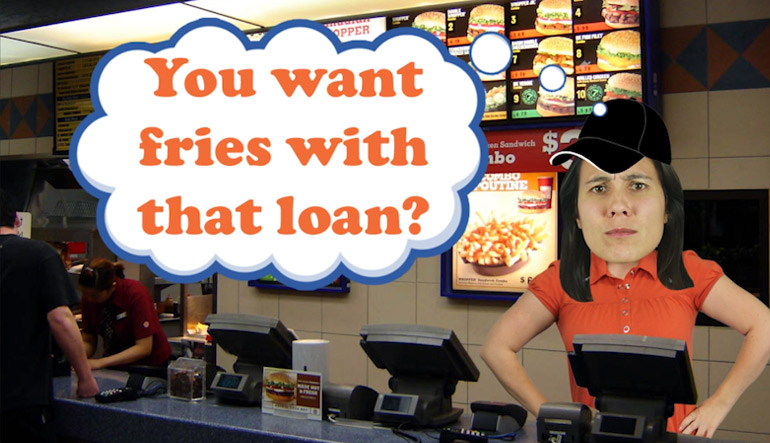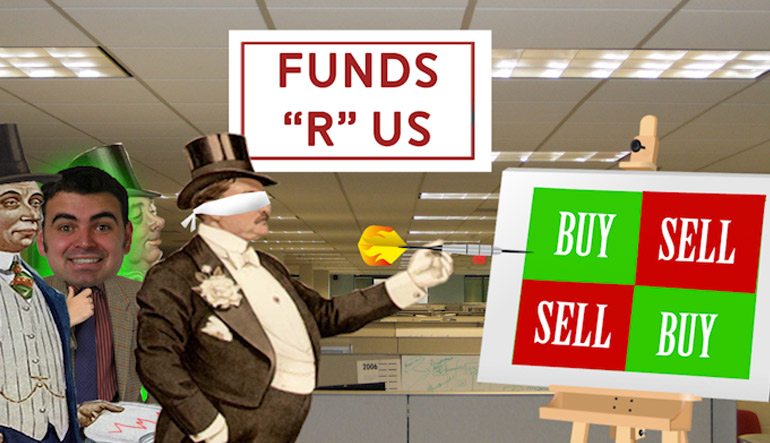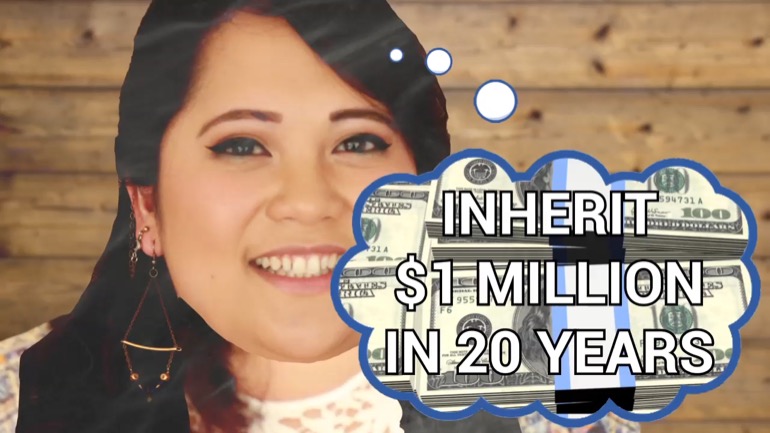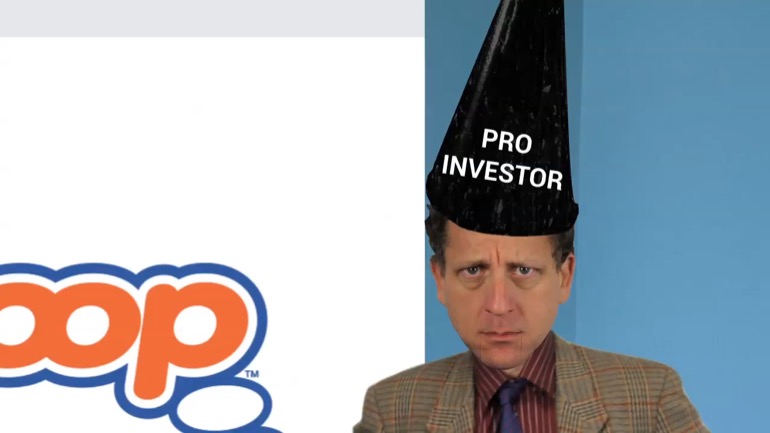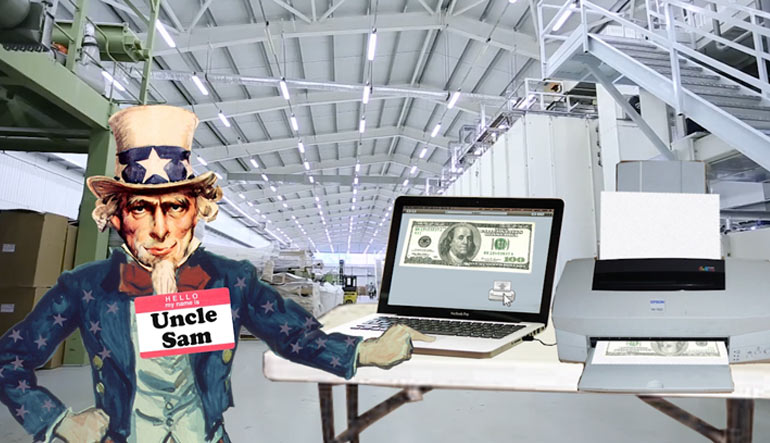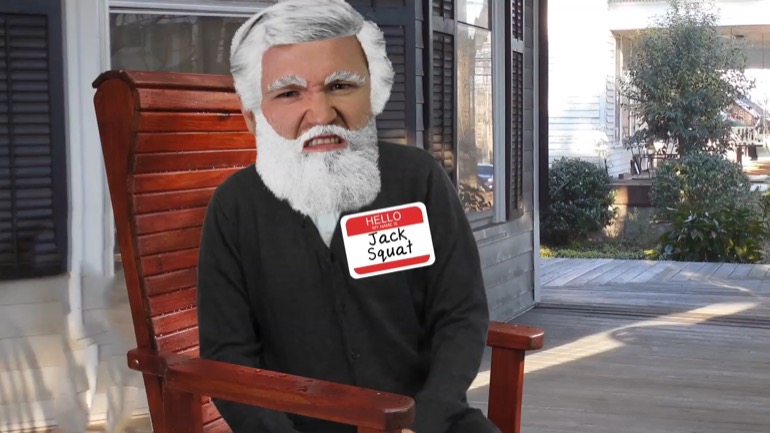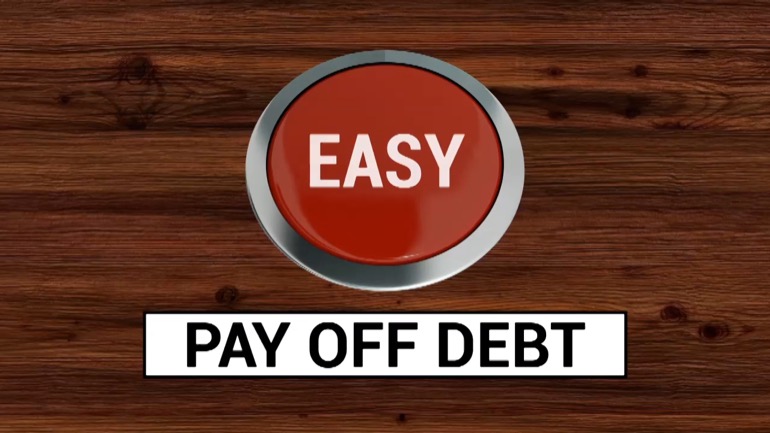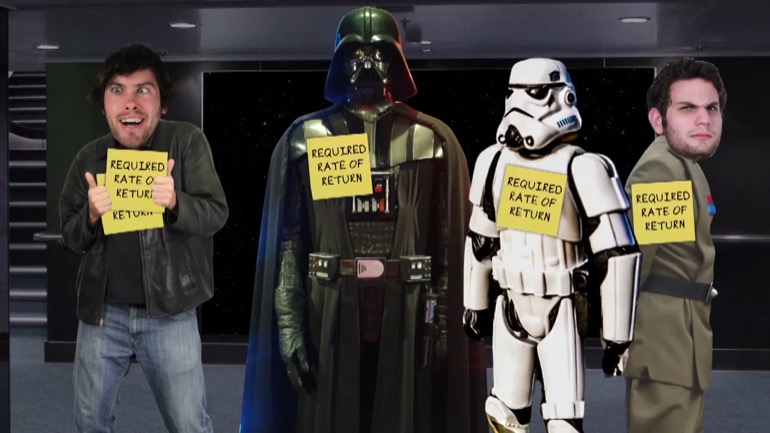ShmoopTube
Where Monty Python meets your 10th grade teacher.
Search Thousands of Shmoop Videos
Principles of Finance Videos 166 videos
How is a company... born? Can it be performed via C-section? Is there a midwife present? Do its parents get in a fight over what to name it? In thi...
Company Formation, Structure, and Inception: Unit Intro. Sorry, Leo DiCaprio fans—we're not going to be breaking down the plot of Inception. We'r...
Okay, so you want to be a company financial manager. It's basically up to you to make money for the shareholders. It would also be swell if you mad...
Principles of Finance: Unit 4, What’s That Company Worth? 9 Views
Share It!
Description:
Robot pizza is the way of the future. The way of the present? Checking out this video on the different ways to view and value a company.
Transcript
- 00:00
Principles of finance ah la shmoop what's that company worth
- 00:07
Well sometimes the world values companies based on what they
- 00:09
call wall street metrics things like price to earnings ratios
- 00:14
and comparable stock prices or values of competitors maybe even
- 00:18
multiples of revenue But that's just one set of ways
Full Transcript
- 00:21
to view or value a company and since there are
- 00:24
so many different types of company's having a few perspectives
- 00:28
on valuing them is probably a good idea So from
- 00:31
an investor's perspective the company can be evaluated through green
- 00:36
lenses You've already seen it a few times in the
- 00:38
course When you put a dollar in today as an
- 00:40
investor well you have to get more than a dollar
- 00:43
back tomorrow or it was likely a bad deal and
- 00:46
hint from warren buffett Don't do the bad deals only
- 00:49
do the good ones but when you go shopping for
- 00:51
stocks or companies or projects to invest in there's a
- 00:54
discipline that most financial managers follow so that when the
- 00:57
ceo or bored or angry shareholders yell at them they
- 01:01
have a foundation to their actions And it's usually something
- 01:04
a little more sophisticated than because my friend told me
- 01:07
To the easiest and probably least useful evaluation metric is
- 01:11
book value Recall that this metric is just the net
- 01:15
balance sheet value you are holding for a given thing
- 01:19
with your nerdiest bean counter hat on like you know
- 01:22
you bought a tractor smelting factory ten years ago for
- 01:25
one hundred million dollars Today you hold it on the
- 01:27
books for being worth twenty million in value and well
- 01:30
it works perfectly fine It'll work for another twenty years
- 01:33
and while it might sell ala carte for twenty million
- 01:36
dollars on ebay today well it produces tractors really cheaply
- 01:40
and just fine Thank you very much or said differently
- 01:43
for only twenty million dollars of net invested capital today
- 01:46
from a book value perspective while that smelter is able
- 01:50
to produce five thousand tractors a year yeah really efficient
- 01:53
production protractor So in this case the book value is
- 01:56
highly understated and it's way more common for book value
- 02:00
to be understated than overstated If the company you're looking
- 02:03
at uses honest non fraudulent gap accounting most accounting laws
- 02:07
tend to over depreciate things rather than under it Appreciate
- 02:11
them Banks insurance companies often arrive a very large part
- 02:14
Of their value from the assets they have in the
- 02:16
door that they manage they take a fee at fi
- 02:19
turns into cash By law they're required to hold a
- 02:22
minimum amount of cash for the nineteen twenty style rainy
- 02:25
days So book value gets looked at when valuing banks
- 02:29
But again book value is kind of window dressing in
- 02:32
just one very small element in valuing things One silly
- 02:35
ratio you'll hear quoted every now and then is market
- 02:39
to book ratio and it's really a measure of how
- 02:42
bad the book value accounting system is in measuring the
- 02:44
rial market value of something so let's say we have
- 02:48
an easy to value public company has forty million shares
- 02:51
outstanding and trades at eighteen bucks a share That gives
- 02:53
it a market capitalization of seventeen Twenty million The book
- 02:57
value of all of its asset is one hundred twenty
- 02:59
million dollars i e net value held on the books
- 03:01
for that tractor smelting plant the value of remaining leases
- 03:04
cash debt patents and so on The market tto book
- 03:08
ratio here is six it's just the market value of
- 03:11
seven hundred twenty million divided by the book value one
- 03:13
Hundred twenty million and that gets you six x This
- 03:15
is a relatively high ratio It either means that the
- 03:18
tractor company is really old and has appreciated a lot
- 03:22
of it's today Well functioning assets to being worth almost
- 03:25
zero or this isn't a tractor company at all and
- 03:28
instead is a computer software company where book value truly
- 03:31
has almost no correlation with anything in theory Ah high
- 03:35
ratio like this anything better than two acts would be
- 03:38
a reflection that management used its cash well in buying
- 03:43
things investing in things for the company But since time
- 03:46
isn't an element in book value calculations while it's really
- 03:50
hard to tell whether or not they were good like
- 03:52
if the company's financial managers double the value of the
- 03:54
company in two years well that's probably really good unless
- 03:57
it was a crazy hot area like internet search in
- 04:01
nineteen ninety nine you know in google being born in
- 04:04
which case well they would have lagged that search market
- 04:07
by six hundred percent Well conversely if the manager's had
- 04:10
taken twenty years to double the book value of the
- 04:12
company to create a market to book of two ex
- 04:15
well then they compounded it just seventy two over twenty
- 04:17
or about three point five percent per year Not very
- 04:21
good return So you got to take all these book
- 04:23
value numbers with a grain of salt but they're important
- 04:25
paying attention to all right moving on that was book
- 04:28
value Now we're looking at the wall street metric of
- 04:30
p e ratios price to earnings ratio is got it
- 04:34
well they're probably the most common metric used by normal
- 04:37
people to value public or large companies while most small
- 04:41
companies don't have really fern ings or a long history
- 04:44
of earnings that can derive fair multiple based on revenue
- 04:47
growth margins and cash flow production with calculation on this
- 04:50
one's easy company acts has a hundred million chairs and
- 04:53
we'll learn after taxes appreciation and everything two hundred fifty
- 04:56
million dollars they earn how much per share Well two
- 04:59
hundred fifty million five hundred million shares is to fifty
- 05:01
a share Their stock trades of fifty bucks it's twenty
- 05:03
times two fifty twenty times earnings Stock markets historically hovered
- 05:07
around fifteen twenty times earnings roughly depending on prevailing interest
- 05:11
rates and the overall global economy and a bunch of
- 05:13
other factors but twenty times is not a crazy high
- 05:16
multiple it's high but not crazy high so let's think
- 05:19
about this number in context of real life Your family
- 05:21
owns a pizza parlor You worked your tails off all
- 05:24
year long serving pepperoni beer and salad things you're one
- 05:28
very large restaurant does a million dollars in sales that
- 05:31
year and after paying for bread electricity booze rent insurance
- 05:34
labor little league marketing sponsorships and whatever else you net
- 05:37
after everything a hundred grand in earnings all right someone
- 05:40
comes along and wants to buy your pizza parlor what's
- 05:43
likely you'd be thinking you'd sell it for what three
- 05:45
hundred grand for hundred grand at that number you just
- 05:48
sell and move on But if your parlor received a
- 05:51
quote stock market multiple you'd be getting twenty times earnings
- 05:55
or twenty times that hundred thousand dollars or two million
- 05:58
dollars for your pizza parlor Doesn't that sound ridiculously high
- 06:01
for a building with bread and light like tomato sauce
- 06:04
in it Some cheese and you don't even own the
- 06:07
building is part of all this you just rented so
- 06:09
yeah that's crazy high but what if someone owned five
- 06:13
Pizza parlors and had a lower body making the pizza
- 06:15
and kids could custom make their own pizza exactly the
- 06:19
way they wanted it with x percent cheese and y
- 06:21
percent spiciness and z percent crusty nous and have it
- 06:25
all delivered to their home by a drone And they
- 06:27
could watch it all under glass and a webcam viewing
- 06:30
in robot making that pizza's entertainment so that they'd finally
- 06:34
shut up for fifteen minutes while the owner you know
- 06:36
did the beer thing And what if the owner of
- 06:37
robot pizza had patents for all his pizza Robotic stuff
- 06:41
in his much smaller five restaurants today produced a million
- 06:44
dollars revenue one hundred grand earnings but he had plans
- 06:47
next year to open twenty restaurants in the next year
- 06:49
one hundred restaurants the next year three hundred restaurants with
- 06:52
each one producing twenty grand in profits Well if he
- 06:55
had three hundred restaurants coffin out twenty grand a year
- 06:58
will that be six million a year in profits And
- 07:00
now there's no guarantee he grows from five parlors two
- 07:03
three hundred in just three years But it isn't crazy
- 07:06
given their how into the robot maker the kids seem
- 07:09
To be so now someone looks at buying robot pizza
- 07:11
and the price is way higher than twenty times earnings
- 07:14
What if they offered ten million dollars What does that
- 07:16
number mean Well what they're getting at is which year's
- 07:19
earnings is that ten million a multiple of against this
- 07:23
year's hundred grand in earnings it's one hundred times earnings
- 07:26
crazy high but against the three years from now projected
- 07:29
earnings of six million dollars it's only like one point
- 07:32
seven times earnings crazy low But that number carries a
- 07:35
whole lot of risk that funeral kids fall out of
- 07:38
love with a robot pieces or that one of them
- 07:40
escapes the glass and enslaves the kitties and makes them
- 07:43
so tennis shoes all day long for a dollar The
- 07:46
basic idea here is that there are lots of variables
- 07:49
lots of risk lots of unknowns When you hear journalist
- 07:52
quoting that x y z company just sold for an
- 07:55
insane hundred times earnings multiple it's likely that is more
- 07:58
of the same story as robot pizza here Probably there
- 08:01
was a balance of risk and reward in predicting future
- 08:04
earnings and whoever the buyer was paid one hundred times
- 08:06
Last year's earnings Well that buyer haddock Clear vision for
- 08:09
what the earnings would go up tio and they go
- 08:11
up a lot In the next few years they figured
- 08:14
they were really paying just a few times Earnings of
- 08:17
the earnings three years from now not one hundred x
- 08:20
last year's numbers let's Just say good financial managers don't
- 08:23
drive their cars just by looking in the rear view
- 08:26
mirror Unless there's a robot cracks re driving the car
Related Videos
How are risk and reward related? Take more risk, expect more reward. A lottery ticket might be worth a billion dollars, but if the odds are one in...
How do credit card companies work? Credit card companies are, in a way, lenders. They give consumers a rectangular piece of plastic that allows the...
How do some accountants “cook the books”? Cooking the books refers to accountants making company’s financials look much better than they are....
How do you become incorporated? Go to Legal Zoom. Pay $150, file with the state of Delaware or whoever each year. Pay another $150. Most file as LL...
How do you get a startup funded? Depends if we're talking about a tech startup, or a non-tech startup. If you've got a promising, budding tech comp...















































